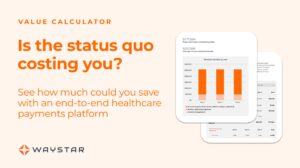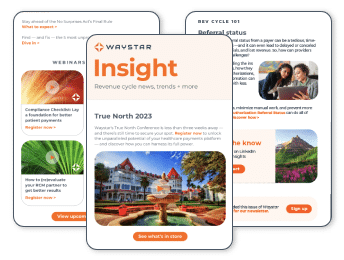Cybersecurity attacks have healthcare leaders rethinking how to protect patient data. One way is to slim down how many partners can access it — including healthcare RCM vendors. But do most health organizations really need to reconsider their vendor pool?
Recent research by The Health Management Academy and Waystar says they do.
The study offers a snapshot of the healthcare RCM industry:
- 73% of leading health systems use 4+ RCM vendors
- Half don’t yet use a platform strategy but plan to within 2 years
- 100% of organizations using end-to-end RCM solutions report positive ROI or expect to within 1-2 years.
In addition, there’s been a 70% increase in adoption of end-to-end RCM platforms year-over-year.
To learn more, download the full report — Accelerate healthcare financial performance with an RCM platform strategy — or keep reading for three top takeaways.
3 facts from the RCM platform strategy report
HEALTHCARE RCM VENDOR REVIEW FACT:
1. 100% of systems using an end-to-end solution experience positive ROI or expect to within 1-2 years
Today, healthcare leaders are investing heavily in the revenue cycle to support their RCM needs. But a change in strategy that reduces vendors in favor of a single platform requires buy-in from the primary decision makers, including the:
- Chief Financial Officer
- Chief Revenue Cycle Officer
- Director/VP of Revenue Cycle
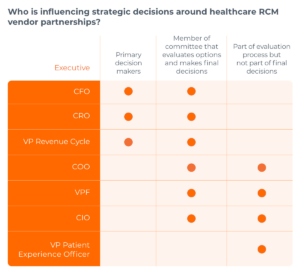
According to The Academy’s survey, these leaders prioritize four factors — in this order— when considering a single-platform strategy:
- Financial return
- Operational efficiency
- Cost reductions
- Ability to replace/reduce multiple vendors
In light of recent security breaches, you may wonder why data security and privacy don’t top the list of considerations. This report was released just before a major healthcare security breach changed everything for healthcare organizations across the country in 2024. At the time this survey was completed, about a third of health system leaders said security was of some importance when considering vendors.
The bottom line, however, is the same pre- and post-breach: Organizations who have reduced their number of RCM vendors have seen financial gains — and the others are receptive to adopting a consolidated platform strategy within one to two years.
“Everything is going to be clear return-on-investment decision making — whether that’s financial return or some other outcome … in support of what we’re trying to accomplish.”
– Chief Revenue Officer

HEALTHCARE RCM VENDOR REVIEW FACT:
2. To build trust + secure data, the “relationship factor” is critical
In order to successfully implement RCM solutions and protect data, healthcare organizations spend money — but they also spend time. Leaders invest hours, energy, and social capital in collaborating with their revenue cycle partner. One major benefit of paring down vendors in favor of a single platform? The relationship factor.
It becomes more manageable to establish long-term relationships that prioritize trust and mission alignment when you have fewer partners.
“We try to pick a partner that aligns very well with us from a values perspective and competence perspective. Then, we invest a lot of effort in those relationships to make sure that it’s a true partnership and it’s going to be a long-term relationship.”
– Chief Revenue Cycle Officer
Taking time to collaborate is key to a successful revenue cycle partnership, influencing hard metrics (time and cost savings) and soft metrics (staff and patient satisfaction).
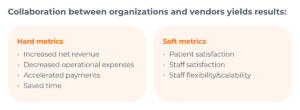
A true RCM partner will walk through effective change management with the healthcare organization, from start to finish of implementation, and long into the future.
HEALTHCARE RCM VENDOR REVIEW FACT:
3. Leaders now prefer enterprise-wide implementation over pilot then expand
According to The Academy’s survey, half of leading health organizations currently use multiple vendors, but all are receptive to paring down partners and software in the next one to five years.
So what’s the hesitation? Concerns include:
- Cost
- Workforce implications
- The process of switching vendors
- Workflow disruptions
On top of that, implementation fatigue is real: Some leaders spend 18 months rolling out new software. That’s spurred many to forgo pilot testing in favor of enterprise-wide adoption, which is more efficient and cost effective. This approach, however, requires additional upfront planning and change management — both of which point back to the pivotal role of relationships in today’s RCM partnerships.
Partnership in action
But a true RCM partner works hand-in-hand with the healthcare organization, offering white-glove client support and a smooth, on-time implementation.
For example, after a 2024 cyberattack, a 60+ hospital system made the switch to a new RCM partner via an accelerated implementation program that was offered for a limited time. The system worked closely with the new partner to launch fast, alleviating cashflow issues almost immediately
It was a quick, collaborative win that helped the system build trust with its new RCM partner.
In the long run, healthcare RCM partners can prove their value by helping monitor success and track progress through metrics like net AR days, cost-to-collect, and avoidable denial write-off rate. And, by being available every time they’re needed.
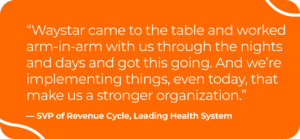
Platform consolidation provides a unique opportunity for health systems to lean on their RCM partners and collaborate to drive greater value for their organization — and their patients.
Think your vendor volume might be causing rvenue leaks?
If you’re wondering how much you could save with a platform approach to managing all healthcare payments (commercial, government, and patient), we’ve got you covered. Use this step-by-step calculator to find out.



